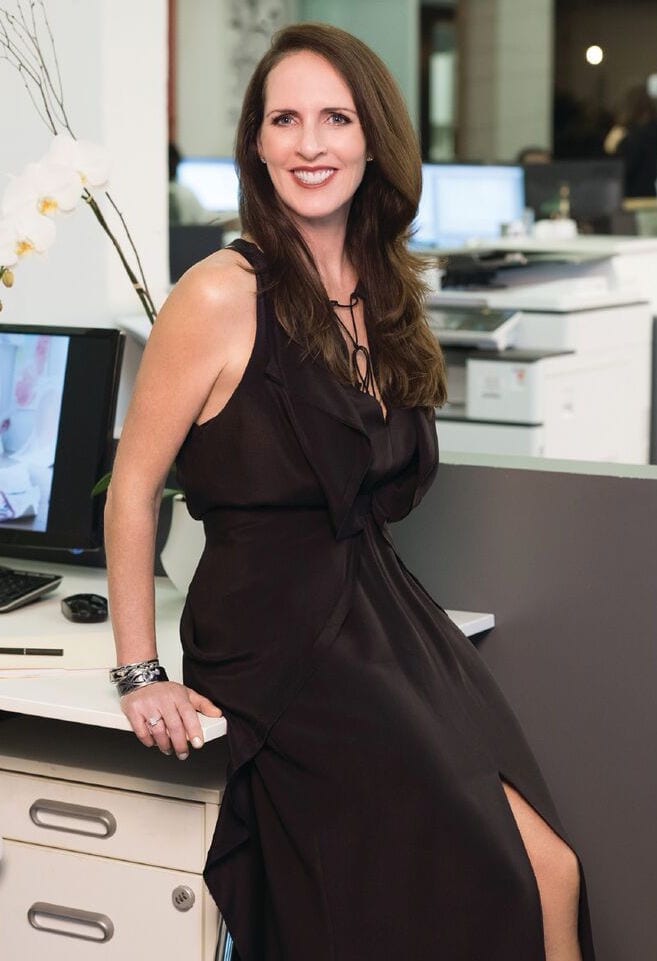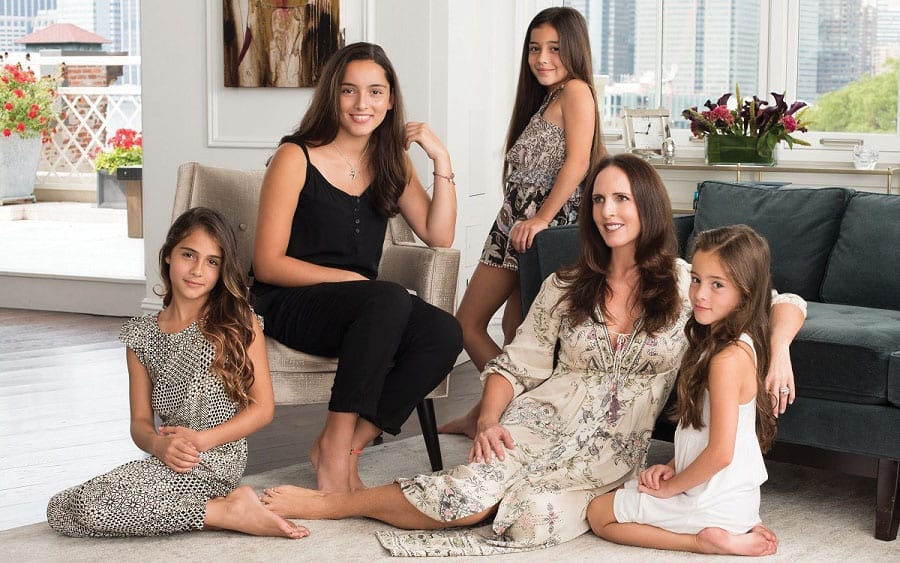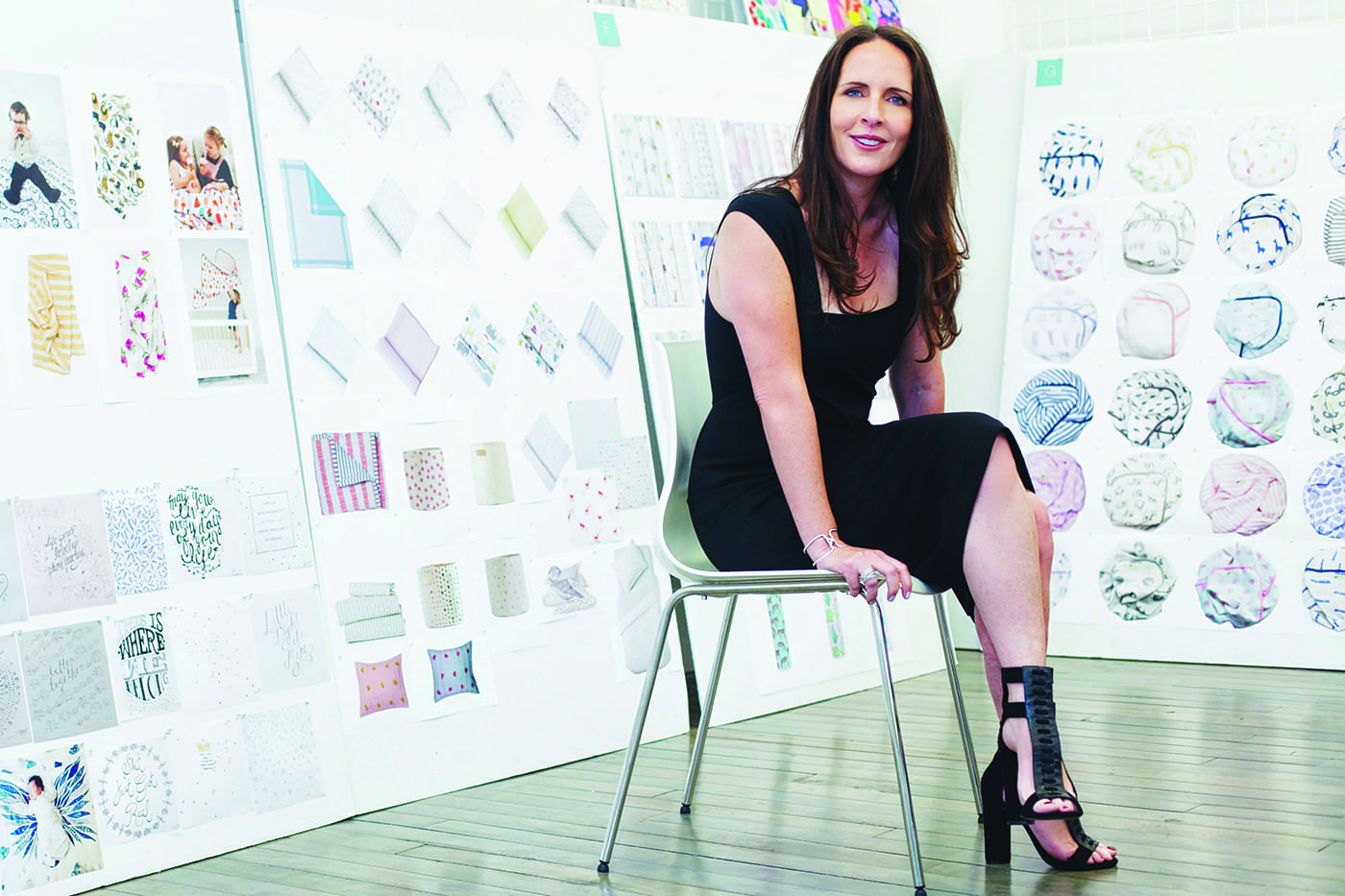Australian native bundles swaddling into big business
You were in your home at your kitchen table when you came up with what is now a multi-million-dollar company, aden + anais?
Well, it really happened when I had my first baby, Anais. I was originally from Australia and moved to the States. I went looking for a product (muslin swaddling blanket) that was very common back home in Australia. To my surprise, no one had ever heard of it over here. I saw it as a huge opportunity because every Australian who has a baby uses this product. I just didn’t understand how American parents had babies without it. So, it was just one of those “ah ha” moments, in terms of seeing an opportunity and wanting to take advantage of that.
Before becoming an entrepreneur, you were in sales at The Economist. What skill-set did you learn there that you were able to impart to aden + anais?

Raegan Moya-Jones brought baby swaddles commonly found in her native Australia to the U.S.
I would say that what I learned at The Economist, as well as my career priorin Australia being in sales, was resilience. I was very comfortable with “no.” “No” didn’t really mean no to me in business. You know, I just sort of went “OK, no for now, but we’ll see.” When I was starting my business, I got a lot of no’s. For me, who had experienced that for over 20 years in my career prior, that wasn’t a deterrent. I just kept pushing through because I knew then no was only a temporary no. The whole notion of the baby products and the swaddling came about through my becoming a mother for the first time. I would never have started a swaddling and blanket business had I not become a mum. Many things aligned all at the right time together that sent me off on the journey of what has now become aden + anais.
And it’s a global company in how many countries?
Oh, well, we sell in over 70 countries, but I have offices in Australia, London, Tokyo, Canada, as well as the head office here in Brooklyn.
You did have an office in Australia. I am curious about bringing a commodity to the country Of origin.
That is a question no one has ever asked me before. Quite honestly, the reason I did that is because I did want to expand internationally because I found out, very quickly, that nowhere in the world knew about muslin swaddling blankets outside of Australia. You are right. The market was very established down there. The reason that I dipped my foot in the Australian pond was because my mum was a bookkeeper, and my sister was my salesperson. So, I had a built-in team, and if you can’t trust your mum and your sister, who can you trust? One of the hardest things and still the hardest thing in this business is finding the right people. You can have the greatest product, the greatest strategy, the greatest process, but if you don’t have the greatest people, it’s all for naught.
A component that I’m fascinated with in business is the hiring of the people. What are your takeaways when you hire someone? What are the things that you absolutely, if you see, you run, and if you see, you run toward or against?
It has changed and evolved from when I started the business to now. When I started the business, the type of people I looked for were, I guess you could term them as best athletes. So, I looked for a great work ethic, intelligence, and kindness. Because, when you’re starting a business and you’re a very small team, you’re really joined at the hip and spend a lot of time together. So, it was very important for me to really like that person as a person as well as, you know, want them to be a part of the business because of what they could bring to it. But in the early stages, people weren’t really hired because of very specific skill-sets. They were hired because they were sort of “all around” great athletes, let’s say. As the business got bigger, it became more important to hire people who had very specific skill-sets. That was really where it differed the most. Up until a couple of years ago, I still hired everybody that came into the business. My team would vet a large number of candidates, get it down to the last couple of people, and then I’d come in to make sure that they were a cultural fit. The culture of this business is so important to me, but as you get bigger, that does get tougher. It is just impossible for me to meet every single person. Today, we are constantly hiring new people for different roles.
How large is your employee base?
We’re up to about 125 people now in the Brooklyn office, which is very robust. There’s a lot of activity, and they are young. I’m definitely the old lady of the office, sadly. I don’t know how that happened. That just happened overnight; one day I was not the youngest. We are a very sales- and marketing-driven company, especially in this day and age with social media being such an important vehicle for specialty consumer products like ours. It just makes sense to hire the younger people who are very much entrenched in that sort of technology and marketing. That is how we end up with the younger demographic.
Retail or wholesale?
We are much more skewed to wholesale. Yes, much more. Given the changing landscape of retail and business in general, we are now starting to focus much more on building out our ecom platforms and that side of the business. Now, we are very heavily skewed wholesale. We work as a third-party seller on Amazon. We don’t sell direct to them; we use their Amazon vehicle and distribution channel. In addition, we have the Targets, the Babies “R” Us and Buy Buy Babies. But the brand was really built in the boutiques base as a boutique brand. Albeit it is a much smaller footprint in terms of the amount of volume you do through that part of the business, but that is really what lifts this brand up. We’re sold in Harrods and in Bloomingdale’s and Nordstrom and places like that, as well as all the beautiful specialty stores on High Street in London. That’s how the Royal baby ended up wrapped in one of our blankets because she bought it in a beautiful boutique on High Street.
Do you have an exit strategy?
I think you always have an exit strategy somewhere in the back of your mind. What I’m a hundred percent sure of is that I have no interest in running this business forever, taking it public, that sort of thing.
You’re not interested in taking it public?

Raegan Moya-Jones in her Brooklyn, N.Y. office.
Absolutely not. I have no aversion to that happening, but it won’t be on my watch. So, what I want to do is make sure this business is in such strong standing that when I hand over the keys to the kingdom to a new owner, they will not ruin the ten years of blood, sweat, and tears and the brand that I am obviously extremely passionate about. When the timing is right for that, I’m not sure, but what I do know is being the mother of four daughters is so important to me because my girls (especially the eldest) really have some sense of what her mum does. The other girls haven’t got a clue. They just know mum goes to a cool office in Brooklyn every day where dogs run around, and we have ping-pong tables. They have no sense that their mother started a business from scratch, grew it to over a hundred million dollars, a global brand, no clue, right? I want to make sure that in 15 years, when I’m having a drink at a bar with my girls and talking to them about life, I can point to aden + anais, which will hopefully be a much larger company, and say, “You know, your mum built that while you were little babies from our kitchen table?”
What was the one critical pivotal moment that aden + anais was at a breaking point or a crossroads of moving forward?
Breaking point or to go forward? It was probably when my partner, who I started the business with, Claudia, wanted out. We were still relatively small. It was only a bit over a year into the business, and we hadn’t even got to a million dollars in revenue at that point. Her husband had a lot of money to put into the business. My husband did not. We kind of got tapped out, and the banks weren’t loaning any money because that was at the beginning of the worst recession since the depression. There was just no way we were getting any capital from banks, but Claudia’s family had money. It was not the way I wanted to go, but it was the only way to keep going because we were growing very fast right from the get go. We started to borrow money from Claudia’s and Mark’s family at 10 percent interest. It wasn’t free money. But I think it made her husband more uncomfortable than it did her that he was, in his mind, funding this business. It was the beginning of the end. It was obviously a very stressful time because Claudia and I were very close friends, not just business partners. When she said, “I want out” and put some demands on the table about what that looked like, I told my husband, “You know, I don’t know if I can do this.” We were building the business. I was working full-time and had three babies. I was doing this from 8:30 at night when my girls went to bed until 3:30 in the morning, and I was exhausted. The thought of having to do it alone without a partner and having to find money to be able to buy her out, was very stressful. I said to my husband, “I just don’t know whether or not I should do this.” He said, “Well, do you believe in this business?” I said, “Absolutely.” And he said to me, “Well, then fight for it.” So, I did. You know, had I given up at that point and said, “I’ll just let her take it over,” or “We’ll close it down,” that would have been a very different end to the story.
Are you and she still friends?
Oh, no. From the minute she sent an email saying, “I want out; these are the demands of what I want to get me out,” I wrote back and said, “Clauds, what are you doing?” I literally wrote, “You’re breaking my heart. Can we at least talk about this?” She said, “There’s nothing to talk about. These are the terms.” I never spoke to her again after that email.
On the wall in front of me is a quote by Albert Einstein that reads, “I am thankful for all those who said no to me. It is because of them I’m doing it myself.” Does that propel you forward?
Absolutely. And, you know, I compete with myself more than anyone. I’m one of those people who does what I do to prove to myself that I can. Through my career, I did get told by a lot of people, “No, no, you’re good just there. Don’t try and look over here,” which frustrated me. So, for me to prove what I was capable of, I had to start my own business because I felt very stifled throughout my corporate career. Sadly, and for the most part, that was stifling from men.

Raegan Moya-Jones poses for a photo with her four daughters.
“Stifling” is a common thread among women, particularly those who are boxed in by a combination of work and family. How did you raise four little girls effectively working a full-time job inventing, launching and building aden + anais?
Look, it’s not easy, but the thing was I absolutely believed in this business and where it was going. I was also acutely aware that my daughters didn’t sign on to be born to an entrepreneurial mother. I never wanted to forsake them for the business. It took me some time, but I realized that I had to make peace with the fact that I was one person, and there’s only 24 hours in the day. There is no doubt that if I didn’t have this business, I would be spending more time with the girls, and if I didn’t have the girls, I’d be spending more time with this business. But that’s not my life. I am confident, though, that my business hasn’t suffered because of my girls, and I’m equally as confident that my girls haven’t missed out because of my business. When I’m Raegan, the mommy, I’m focused on those girls. And when I’m Raegan, the CEO, I’m focused on this business. I don’t do a good job at mixing the two. When I get home from work, which is usually 7ish, I live two blocks that way, I don’t answer emails. I don’t take calls until the girls are in bed. Then, I will get back online and do some work and deal with the international offices and anything I’ve missed during the day.
There was an economic downturn when no one was lending and your partner left. Where did you get the capital?
Friends and family. I really did nickel and dime this business to a point where it got to a stage where VC and PE were interested in looking at it. I never worried about asking my family and my friends to loan me money because I was so supremely confident that it was safe. I think it would have been very different if I was not as confident as I was about where this business was going. So, again, I was borrowing money at 10 percent interest from people who knew me, trusted me, and were pretty comfortable writing me the checks, which could be anywhere from a $20,000 check to a $250,000 check. So, that’s kind of how I did it.
Do you ever ask yourself, “How did all this come to me?”
I’m a very big believer in what you give out you get back. You’ve seen the borders around my office. I’m not particularly religious. I very much believe in the energy of the universe, and that if you give out positivity and kindness, that’s what will come back in abundance and the same is for the reverse. I’ve always tried to be a very positive, kind person. I say to my girls, “What matters most is the kindness that you have in your heart.” That is what I’m most proud of when people tell me my girls are so kind and polite and things like that. I really can’t answer why I’ve been as blessed as I have been because I have a life that most people probably only dream of with a beautiful family, a husband who thinks I’m the only woman in the world, and this incredible business. I just feel very thankful for it all.
Does it ever frighten you?
I have my moments, quiet moments, when I worry that it could all be taken away. I just don’t allow myself to go there because I believe that’s just the way it all works. I’m a big fan of humility. I think there’s not enough of it, especially in the business world. I’d be the last one off the boat if it was sinking. I would do everything to make sure that the team at aden + anais were fine even before myself. I think that that affords a huge amount of loyalty from the people who really do the work in your business.
How important is loyalty?
Oh, loyalty, to me, is everything. Not just in business even but in life. I think it’s vetted through time, but I would say that one of the things I’ve been gifted with is a great sort of sense of people. I don’t often get it wrong. I know right from the beginning. I have got it wrong but not very often. I can usually tell the character of the person within the first half an hour of meeting them.
I want to end on this. Pretend that you’re talking to one of your four daughters, and you are imparting your most significant life lesson. What would you tell her?
I would tell her to live your life through kindness because, if you do that, if you treat people with kindness, it comes back to you a hundred times over.

